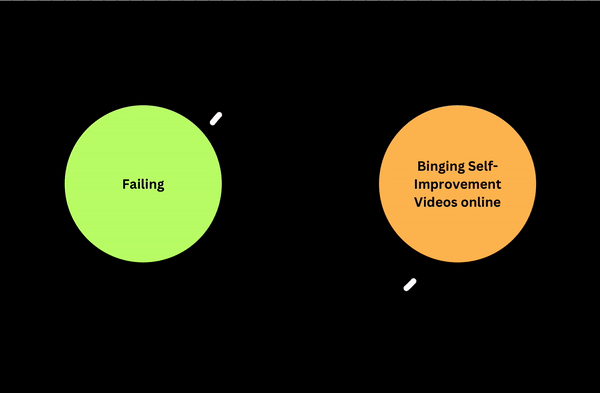There's no worse feeling than thinking that you've done all you can, that you've tried as hard as possible, only to fail.
Of course, it's easy to blame extrinsic factors—my boss hates me; how can I succeed?!
But sometimes, we’re the problem.
Actually, let me rephrase that: sometimes, we’re the solution.
How so? Let’s continue reading to find out, shall we?
👉 So What is Self-Serving Bias?
Self-serving bias describes our tendency to attribute positive events and successes to ourselves and our actions but blame negative outcomes on external factors that are out of our control.
“I aced this test because I’m this super-smart, an Einstein in the making who can never go wrong! You’re all inferior to me, muahaha!”
“I failed this test because my teacher hates me. This is all their fault; if I had a better teacher, *sobs*, I’d do so much better.”
See what I’m getting at?
Believing that you’re always right (however good that is for your ego) and attributing your failures to someone else just because you can’t take your own failure (I’ll get to this later) will just keep you in an endless cycle of seeking self-improvement and breaking down at your failures.
Essentially, it comes down to the humane need to maintain, or enhance, your self-esteem.
We reject negative feedback and simply focus on what we’ve done well, thereby increasing the magnitude of what we’ve done well, even if that’s only a small portion of our entire task.
After all, it’s easier to do that than say, “Okay, I did a bad job. Now my ego has a boo-boo and can only be fixed by alcoholism.”
👉 What Influences Self-Serving Bias?
Okay, it’s not all your fault. Your life isn’t simply a void of nothingness lathered with the tears of despair.
There are two main reasons for self-serving bias.
I’ve already spoken about one of them: self-enhancement. This is where we rely on motivation to maintain our self-esteem.
Essentially, you’re being selective with the information you choose to accept or reject, much like a bored girl swiping on Tinder. You take the information that helps you feel good (the man who is nothing but a tool to grow your already large ego) and reject the information that shows a part of you that you don’t want to see (the man who’s calling you a narcissist) because it hurts to accept that we’re not perfect.
But self-enhancement goes further than this. We all have that one god-gifted friend who’s incredible at, let’s say, juggling. And they know they’re good—how could they not?! They juggle lemons better than Tinder Girl juggles men. But they downplay their abilities at juggling simply to get more praise when they eventually juggle.
“You’re so good at juggling! And you’re so humble, too! Who could ever have known about this talent of yours?” I could. You could. It just felt good to hear someone else validate your feelings. And I get it. Of course, I do. A compliment never goes amiss.
But when this feeds into self-presentation, another underlying reason for self-serving bias, you have a concoction that... well, you’ll see.
Self-presentation is an expressive way of conveying information about oneself to others. You claim, or make, an identity for yourself, and you become that identity.
You are it, and it is you.
For better or worse.
Now this seems quite extreme, but I’ve fallen for it in some regard, and you probably have too. But that’s not a bad thing. In fact, self-presentation is usually quite a good thing. Maybe you’re at work and you want your boss to see you as a leader, so you behave more assertively. And that’s okay.
But trying to influence others’ perceptions of you, something that is inherently out of your control, can easily become manipulative or unethical.
Say your friend has been having a difficult time at work. Naturally, they’re seeking solace, see your welcoming hands, and come to you. And what a coincidence! You’ve been wanting to be more compassionate, so you’re there for your friend. At least, you appear to be. You act present and attentive, patting your friend on their back, giving them tissues to blow their nose on, and even some cake to bury their sorrows on, but you’re doing this to present that image of yourself. That image of you as a compassionate friend. Your mind is elsewhere, worrying about your own menial problems, but at least your friend thinks you’re empathetic to their struggles.
And there, dear reader, is where your own motives and inability to handle the truth lead to self-serving bias.
You want to validate your ego, so you pretend like you can’t juggle. You want to appear as the “perfect” friend, so you (intrinsically) lie to your friend. You believe that your locus of control and importance to others’ lives are infinite.
Reading this back, it all sounds very accusatory and blame-y. I promise you, it’s anything but. I believe that being straightforward (and sometimes harsh) is necessary for this topic, as otherwise we’d find ourselves back in that loop of only processing information that makes us feel good about ourselves.
Plus, some of the reasons for us wanting to protect our egos (majority, in fact) are completely natural and innate. Positive outcomes feel good, whereas negative outcomes surprise us, so we shy away from the negatives. Some people may have had a tough childhood, riddled with pressure, so a fear of failure leads to a desire to not be in a situation where you have to confront failure.
Sometimes, it’s not your fault, so I apologise for the existential crisis. That said, I’ve fallen for self-enhancement and self-presentation. I probably will again. And that’s true for everyone I know. You’re not alone in this boat, so perhaps we can seek solace in that.
👉 Examples of Self-Serving Bias
I've given you some examples, but let’s look deeper. Let’s consider where you may let your ego get the better of you in… a corporate environment? Maybe even the government and economics. Ooh, what about that time when you were scammed as you shopped online?
🔸 Self-Serving Bias in Everyday Life
We’ve all had our fair share of troubles when shopping online.
I remember when I bought jeans online, and oh my, were they magnificent. They came neatly boxed, without a single wrinkle, and dyed in the perfect blue. It made my day. In fact, it made my year.
I’d just conquered online shopping!
I spent the rest of my day humming and skipping, smelling the roses, and running away from the bees that resided in those roses.
Until the next day. My T-shirt’s make was awful. Humming? Forget it. Roses? Wrinkled. Day? Ruined.
But I soon got over it. It was the manufacturer's fault after all!
It’s not like I forgot to sit and wonder why the T-shirt was so cheap, on a 75% discount, and had a review saying, “Terrible T-shirt. I wouldn't wish it on my worst enemies and mother-in-law." Wait, what do you mean that’s exactly what I did?
When my jeans exceeded my expectations, I didn’t praise the manufacturer or distributor; I praised myself for clicking on one button. When the T-shirt failed to meet expectations but came as advertised, I failed to blame my oversight, instead wishing hell on the supplier who did nothing wrong.
My T-shirt may be awful, and that supplier may get fired for the torrid review I left behind, but hey, at least my self-esteem is good!
Actually, I have another example. This happened to my friend, Billy.
Billy is usually a nice guy. He gets into his car, as you do, and drives to work. Traffic is heavy, but it’s no competition for Billy, as he wades through it as if he were Moses parting the Red Sea. He’s proud of himself, and he rightly pats himself on the back.
But on his way back from work, in his hurry to get back to his pet fish, Billy speeds, takes a wrong turn, and finds himself in the mother of all traffic jams. He’s stuck, and no amount of manoeuvring and sweet-talking is going to get him out any faster.
He curses and blames a traffic cop for his unfortunate outcome. He gets consumed with road rage and yells obscenities that I cannot repeat.
But he doesn't accept that it was his wrong turn that got him into the situation he’s in. Yet he still praised himself for driving well in the morning?
There’s nothing wrong with praising yourself for your success, but if Billy can’t take responsibility for his failures—if the failures weren’t his fault in the first place—were the successes his doing?
🔸 Self-Serving Bias in a Business Environment
For our sustainability campaign, my boss wanted me to have a report on the waste management of a nearby building ready. Essentially, my project involved analysing and solving the issues the business has with its waste disposal.
With the help of a friend, I had the report ready, and boy, oh boy, did I praise myself for it. I never stopped talking about how successful it was. I named myself as the main reason for its success, and where I did attribute some of it to my friend, they deserved proportionately more credit.
What would I have done if it had failed? Blame my friend. Blame the uncooperative building manager. Blame the weather. Blame anyone but me.
That’s the problem, especially in a complex environment such as employment. Team projects require cooperation and admissions of wrongdoing, but when our egos get in the way, we strip a layer off our willingness to admit to a mistake.
In the long run, attributing all successes to yourself and failures to others will make you just that little bit harder to like, and intrinsically, you’ll be unaware of what more you could do to elevate your work to the next level. Why? Coming to terms with our mistakes will help us learn, and if we don’t ever accept our mistakes, what have we learned?
🔸 Self-Serving Bias in Economics
Let’s say Joe lives in Country A. Joe works in finance, and he brings home a decent paycheck every year. But he’s not satisfied. He wants more. The cost of living crisis means he can no longer afford bottled mineral water, and instead he has to settle for (the already potable) tap water.
The injustice???
And coincidentally, the government of Business A has increased the wage thresholds in the financial world. Joe yelps with delight, “They’ve done this for me! I can now live like a king!”
Joe believes that the positive outcome was for his benefit. He uses this belief to validate his own feelings of self-importance, not accounting for how the additional tax money that the government got simply went into funding their own lavish lifestyles. Why should Joe have to care about that, after all?
This ties into confirmation bias. If the political party that Joe supports makes a suboptimal decision (let’s forget fixing the potholes and instead force citizens to pay more bribes!) he may seek information to validate this decision. If it begins to get widely criticised, he’ll blame other factors, such as the police officers who take the bribes or the driver of the car who didn't see the pothole and is now stuck in it.
This doesn’t have to be on a scale as large as the government. Think of salary negotiations. Joe bargains for a larger salary and gets it—yay! But he’s not surprised. He’s a great and efficient employee, after all. But if he hadn’t received his raise, Joe would’ve blamed the economy, for example. Sure, the economy is booming and wages are being increased everywhere, but Joe blames it anyway. He can’t accept that maybe he’s not the star employee he thinks he is or that the time he called his boss “the human embodiment of a pothole” didn’t help his PR.
Why? Joe has fallen for self-serving bias.
🔸 Self-Serving Bias in Football
I was playing football in school some years ago. We’re trailing 1-0 and get a 95th-minute penalty. I stepped up to take it. And I... missed?
I looked down at the turf, mindlessly kicking it, secretly wanting to bring out a ruler and show why its excessive length was the reason I missed. I want to bring out a wind vane and let it show why the wind deviated my shot from the top right corner to the face of an innocent bystander in Row Z.
But I don’t want to admit that I was nervous, and it was a terrible shot. I don’t want to admit that I knew I’d missed as soon as I kicked the ball; instead, I just want to save face.
As the years went on, I believed my lie. I never took the blame for missing the penalty and became a propagandist for trimming turf.
If I had accepted that it was a bad penalty, perhaps I’d have become better at them over the years. I’d have practiced and avoided making the same mistake instead of mowing turf.
This can happen to managers as well. They coach a masterclass until their anything-but-level-headed centerback kicks someone in the face in the 67th minute (it was a mistake, I swear!). They go down to ten men and lose.
Instead of the manager accepting the red card and accepting that the red card was deserved, he blames the referees and, in a moment of stubbornness, refuses to change his tactics. He wallows in the injustice of it all, even when he had the chance to alter his tactics.
The problem never gets resolved, and going down to ten men becomes an everyday occurrence.
Self. Serving. Bias.
🔸 Self-Serving Bias in Fantasy Premier League
You make a risky transfer. Punts are fun, after all. But it backfires miserably. So, you blame everything—the player, bad luck, the FPL Gods—but you don’t consider that the decision you made was objectively bad.
You got carried away making a fun transfer, and hope led you astray. The best thing to do in this case is to accept your mistake and learn from it. If you do, you can grow out of this unfortunate situation, but if you don't, you find yourself in another loop.
That said, when it comes to FPL, it’s best to understand that your locus of control is extremely limited. You can control only a few things, and the outcome is not one of them. So ensure that your process is good, that the decisions you make are good, and that the EV is good, so that you’re more likely to benefit from positive variance.

👉 Solutions and Conclusion
Perhaps the most obvious, yet most aspirational, solution is building self-awareness.
By reading this article and other such pieces of work, you’re learning more about yourself. You’re becoming more self-aware.
So pat yourself on the back and tell yourself that you’re doing a good job!
Become more receptive to feedback. Yes, hearing negative feedback will hurt, but in the long run, you’ll be a better person because of it. Positive feedback is nice, but if all you hear is overly flowery language, the ceiling of your growth is automatically restricted.
Find your definition of success.
Mark Manson has eloquently put down his thoughts on this matter, and I will link it here. When you define your success, you control what your ego needs to be validated; hence, you’re able to minimise just how much positive or negative feedback you’re able to consume.
Take responsibility. Once again, I’ll let Mark Manson do the explaining here. But by taking responsibility, you grow as a person, become more aware of your locus of control, and find solutions even in awkward spots.
Understand that you worry far more about what others have to think of you than they actually do. Coming to terms with this fact—something that even I struggle with—will help you overcome self-presentation and instead focus that energy on yourself.
Be empathetic. Zoom out and look at situations from a rational, third-person perspective. And be open to growing.
Even if that includes being torn down before you rise up. Which you will do.









vewry kool